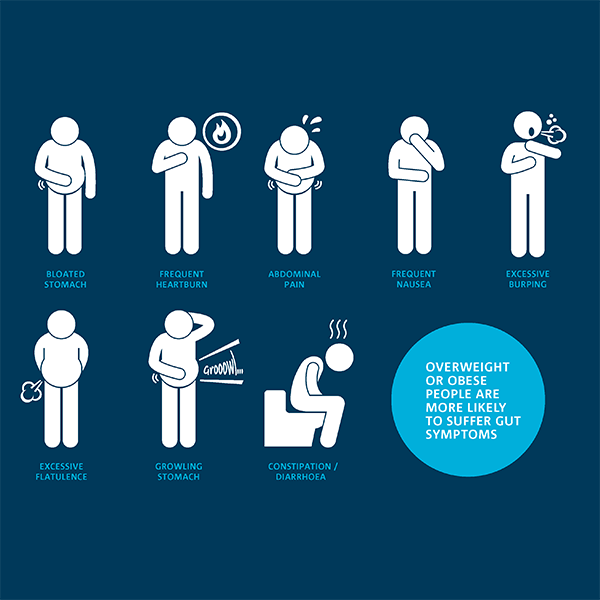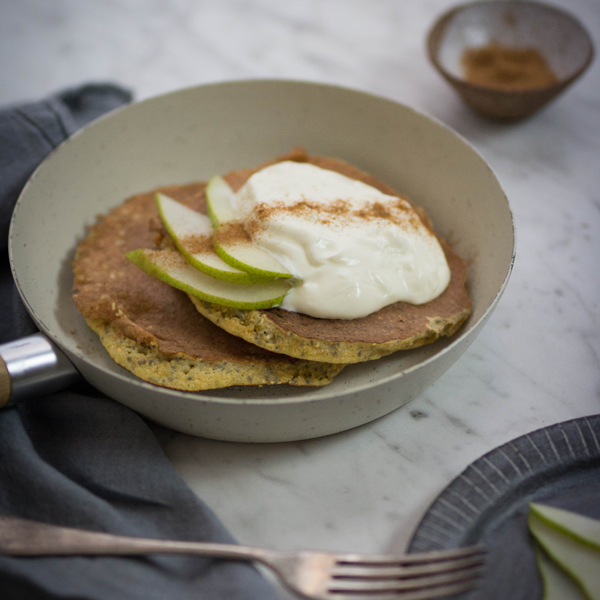Do you experience regular stomach problems? You're not alone - around 50% of us report having tummy trouble. The question is whether it's just the normal comings and goings of the stomach or if it's a sign of poor gut health.
While there are plenty of quick solutions you can buy off the shelf, the science shows that the real gut health cure lies in eating the right foods. Unfortunately, when it comes to the right foods, the average Australian diet is found lacking.
What we typically do when we experience gut distress is eliminate certain foods from our diet, like foods with gluten or lactose. This is not to say that some people aren't sensitive to lactose or gluten - this is a problem for many - but for most a more holistic approach to gut health is necessary.
Concerned about the state of your gut? Take the Gut Health Check to find out!
What are symptoms of poor gut health?
Tummy trouble isn't something we usually talk about in public but it's good to know that not all aches and pain are symptoms of poor gut health. We all experience stomach issues from time to time but when the gut symptoms are recurring and bothersome it can be a bigger problem.
Please note some of these symptoms can be signs of more serious health issues so please see your GP if you are experiencing severe pains.
Typical signs of an unbalanced gut include:
- Regularly having stomach issues like bloating and heartburn can be a sign of an unbalanced gut.
- Burping, passing gas and having a growling stomach is normal but if it's causing you distress it can be a gut health issue.
- Abominal pain can be a sign of poor gut health but it can also be a sign of something more serious.
- Constipation or diarrhoea happens from time to time but if it is a regular occurrence it can be a gut health problem.

What exactly is a healthy gut?
A normally functioning gut requires both plenty of good bacteria and a wide variety of good bacteria.
From the day we're born our gut is colonised by different microorganisms, like bacteria, viruses, yeasts and fungi. Together these microorganisms are referred to as the microbiota and they play an important role in our good health.
We damage these microbes when we eat, and feed the microbes, the wrong types of food. The worst culprit is perhaps a low-fibre diet combined with lots of fat and protein, which incidentally is also the makeup of the average Australian diet.
What is gut-friendly food?
As we mentioned earlier, the supermarkets are well-stocked with products that claim to be good for your gut. While more research is needed, there is limited proof that products like probiotics, fermented food and green smoothies support your gut directly.
Actual gut-friendly food are common-sense foods that are rich and diverse in fibre.
We know fibre may not be what you feel like when you have stomach problems but when it comes to gut health, you’ll want plan long-term. The better you eat over time, the better you’ll be supporting your gut.
Great sources of fibre include:
- breads and cereals containing rye, wheat and oats
- legumes like lentils, beans and peas
- fruit like bananas, berries and oranges
- vegetables like snow peas, broccoli and sweet potatoes

What should I cook?
Food that is good for your gut doesn't have to be bland, boring or difficult to eat. In fact, a gut-friendly diet is just about as colourful as a diet can get. Aim for plenty of vegetables of different colours and make sure you include grains as a part of most meals.
For breakfast, try our chai-spiced smoothie bowl, or if you have a bit more time on your hands, try the delicious pear and cinnamon protein pancakes.
For lunch, our turkey meatballs on zucchini pasta is a quick and tasty favourite. Finally, our recipe for grilled steak on parsnip mash is a winner at the dinner table.

How much fibre do I need?
If you are eating a diet rich in wholegrains, fruit, legumes and vegetables, you’re likely eating enough fibre to properly balance your gut bacteria.
On average, Australian women consume about 21 g of fibre per day while Australian men consume about 25 g per day. We recommend instead aiming for 30-40 g of fibre per day.

Is there anything else I can do?
We know that people who are obese or overweight are more likely to have poor gut health than people within a healthy weight range. Symptoms such as heartburn, acid regurgitation, bloating, increased stool frequency, diarrhoea and upper abdominal pain are more prevalent among people with a high BMI.
There is scientific evidence that disrupting the abundance and diversity of good gut bacteria can lead to the development and progression of obesity.
The good news is that a gut-friendly diet with plenty of high fibre foods reduces energy uptake and promotes satiety, which can help you lose weight.
Need some help?
If you'd like a simple plan that helps you improve your gut health and lose weight, join the CSIRO Total Wellbeing Diet today!
Not sure if your gut needs a boost? Take our quick, 5-minute Gut Health Check now!